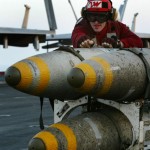Wednesday
Jan062010
Israel Concerned over the U.S. Arms Deals with "Moderate" Arabs?
 Wednesday, January 6, 2010 at 13:53
Wednesday, January 6, 2010 at 13:53  According to Haaretz, major arms deals signed between U.S.A and Egypt, Saudi Arabia, Jordan and the United Arab Emirates have caused concern among Israeli officials; although Israel had already been informed about the scope and content of these agreements.
According to Haaretz, major arms deals signed between U.S.A and Egypt, Saudi Arabia, Jordan and the United Arab Emirates have caused concern among Israeli officials; although Israel had already been informed about the scope and content of these agreements.On the other hand, a report submitted to Congress by Pentagon states that none of the deals would "alter the military balance in the region." It is claimed that officials in Washington defended the arms deals on the basis that they will boost the moderate axis in the Middle East, deter Iran and in particular strengthen Saudi Arabia's military capabilities in its war against al-Qaeda in Yemen.
These are the contents of deals:
To Egypt:
- Four batteries of Harpoon Block II anti-ship cruise missiles (20 missiles).
- Four fast missile boats.
- 450 Hellfire antitank missiles.
- 156 jet engines for F-16 jets in the wake of a deal in October for the sale of 24 F-16 C/D fighter aircraft equipped with electronic warfare suites. It is stated that the F-16s supplied to Egypt are less advanced than the aircraft of similar type in Israel's arsenal.
To Saudi Arabia:
- 2,742 TOW-2 antitank missiles.
To Jordan:
- 1,808 Javelin antitank missiles with 162 launchers in the wake of a deal in September for more than 80 advanced rocket launchers, of types that have been sold to Israel in the past.
To UAE:
- Ordnance at a value of $290 million.
- 1,600 laser-guided "smart" bombs
- 800 one-ton bombs
- 400 bunker buster bombs.
It is also stated by the newspaper that although the UAE does not pose a threat to Israel and is not considered an enemy state, officials in Tel Aviv are concerned about this deal.
In the same report submitted to Congress, it is mentioned that there have been no arms deals since Barack Obama took office. So, what is really behind Israeli officials' concerns? Is it the fact that its neighbours are going to be armed with better high-tech devices, no matter how "moderate" they are? Or is it a subtle "protest"/"complaint" in order to use the argument that the 'balance of power' may tilt away from additional military aid to Israel from Washington following the 2007 Memorandum of Understanding, which promisws $30 billion to Tel Aviv over the following 10 years?

